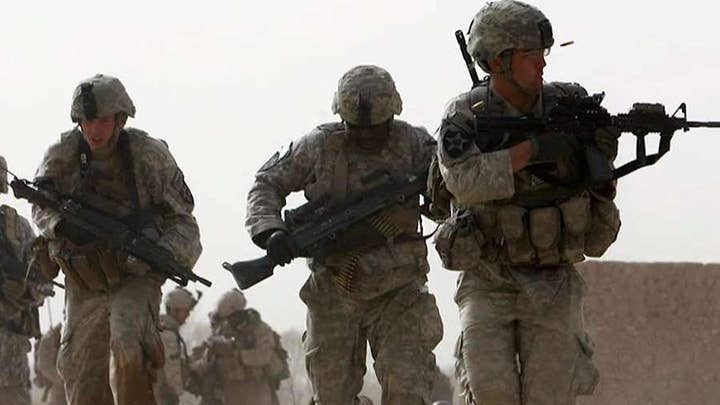Congress needs to reassert itself when it comes to
NEWYou can now listen to Fox News articles!
This month marks the 20th anniversary of Operation Iraqi Freedom. Above all else, it is a time to offer tribute to the more than 1.5 million brave Americans who served during the Iraq War.
This anniversary also warrants reflection on where war powers rest in our republic. Those troops we honor this month may be surprised to know the legal authorization to wage war against Iraq is still on the books today, even though it serves no operational purpose and Iraq is now a strategic partner. By failing to repeal this outdated authorization, we leave it subject to potential presidential misuse. Congress has effectively surrendered its responsibilities to declare and oversee wars to whoever happens to be president.
We are part of a bipartisan effort to reclaim both.
In the centuries before America’s founding, unelected and unaccountable monarchs declared wars against each other that their subjects were forced to fight. As a result, the framers of our Constitution were understandably cautious when it came to war powers.
They feared vesting war powers solely in the executive would lead more easily to war. Instead, they placed power in the hands of the legislature, where robust debate and reflection could prevent armed conflict, or achieve a wide consensus before entering into it. It was a characteristically wise decision—but a decision that would only work as intended if legislators led on matters of war or peace rather than abdicating them to the executive, as Congress, regardless of the party in control, has done for decades.
While the president is the titular commander-in-chief of the American military, the Constitution grants Congress the power to formally declare war. However, Congress has not done this since World War II. It has instead passed resolutions approving more limited military operations called Authorizations for Use of Military Force, or AUMFs.
This is the legal means under which recent military engagements in the Middle East were fought. But even after those missions ended, and our national security focus shifted, the AUMFs remain law. Presidents, both Democratic and Republican, have interpreted them as a way to launch combat operations unrelated to their original purpose and without congressional approval.
To give some sense of how outdated these AUMFs are, few members of the current Congress were even in office in 2002 when Operation Iraqi Freedom was authorized. Only three of the 100 members of the current Senate were present in 1991 when the first Gulf War was authorized.
But we are no longer at war with Iraq. We are now allies.
When Congress cedes the power to make war to the president, the country loses the important debate and reflection that the founders hoped would precede such monumental decisions. And the legislative branch abandons its responsibility to oversee military engagements, to ensure our wars are waged effectively, and to make sure that those wars end once our objectives are achieved.
Congress needs to reassert itself.
The first step to do that is to remove these outdated authorizations. We have reintroduced legislation that would repeal both the 1991 and 2002 AUMFs, eliminating any potential for future misuse and formally ending the Gulf and Iraq wars. Deauthorizing these AUMFs would also signal to the world that Iraq is a partner in advancing stability in the Middle East.

Military personnel lower their heads during ceremonies of the encasing of the US Forces Iraq colors, in Baghdad, Iraq, Thursday, Dec., 15, 2011. The ceremonies mark the official end of the US military mission in Iraq. (AP Photo/Pablo Martinez Monsivais, Pool) (AP2011)
Our bill was approved this week by the Senate Foreign Relations Committee, setting the stage for a full Senate vote. It has broad bipartisan support, with twenty-two original cosponsors evenly divided between Democrats and Republicans. President Joe Biden has also backed repealing these AUMFs and restoring war-making powers to Congress.
James Madison wrote, "that the Ex[ecutive] is the branch of power most interested in war, and most prone to it. It has accordingly with studied care, vested the question of war in the Legisl[ative.]"
This is a chance for the "legislative" to finally live up to its responsibilities.
Our warfighters demonstrate incredible valor and sacrifice in the course of doing their duty. By comparison, it should not be hard for us to do ours. It is time for Congress to reclaim the power to declare, oversee, and end wars. Just as our Founders intended and as our men and women in uniform deserve.
Republican Todd Young represents Indiana in the U.S. Senate.




إرسال تعليق